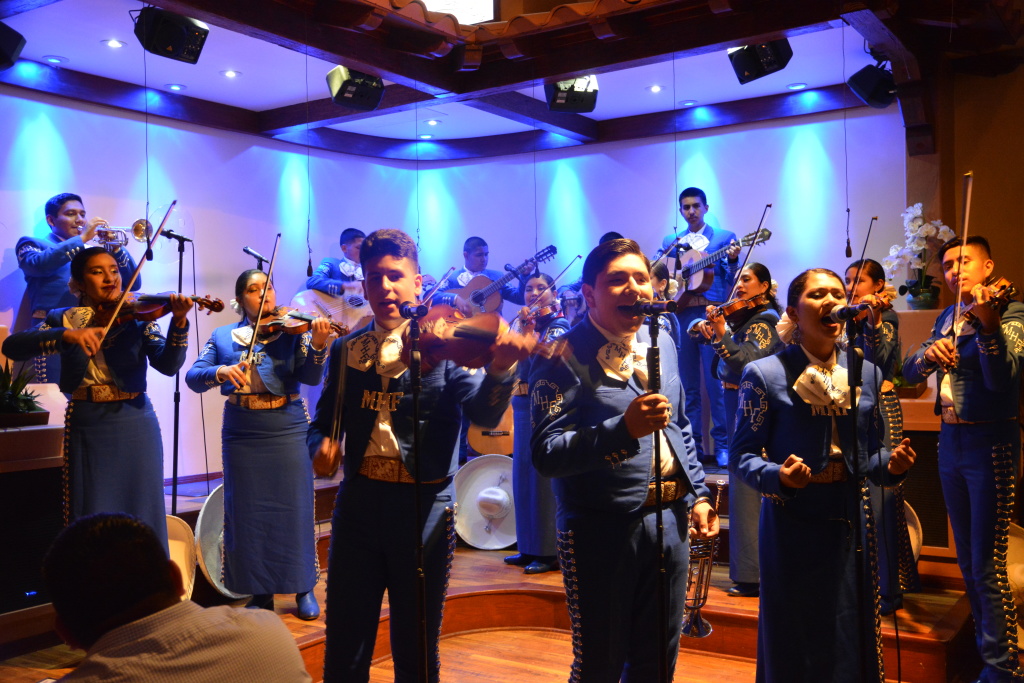LA’s Mariachi tradition seeps out across the nation


It’s a Friday evening at La Fonda de Los Camperos, near MacArthur Park, LA’s most revered venue for mariachi music and home to the Grammy-winning ensemble Los Camperos. But the stars of tonight’s show are from Chicago. Sixteen teenagers, eight boys and eight girls. They’re called Mariachi Herencia De México.
Melanie Juarez is thirteen, she plays guitar and is one of the lead singers. She’s thrilled to be playing tonight at La Fonda. “It’s just really a big honor to be here, knowing that those mariachi Camperos actually perform here and they’re here and me having to be here it’s something amazing.”
Marco Villela is fourteen. He plays the trumpet and sings: “I am quite very honored to be here because I’m a very huge admirer of the Camperos and it’s just unexplainable how amazing this is.”
The man behind Mariachi Herencia is Cesar Maldonado, an investment banker who grew-up in Brighton Park, a Mexican immigrant barrio in Chicago. Maldonado is passionate about mariachi music and was determined to give back to his community.
“I think in this time, where people continue to question the contributions of our community in this country, I wanted to do something different, something relevant to our community, to our kids, at the same time recognizing the importance of saving mariachi music for future generations and teaching young kids, young students about the music of Mexico.”
Maldonado started out as a promoter, scouting out mariachi groups from LA to and booking them in Chicago’s performing venues. In 2012, he took LA’s Mariachi Los Camperos to Chicago’s Mexican community. He remembers a day, during that trip, when he was having breakfast with the legendary leader of Los Camperos, the late Nati Cano.
“Nati told me at that breakfast meeting, he said, ‘Cesar, if anyone is going to push mariachi to the next level, it’s you. The way you’re going to do it is with the kids”.
In 2013, Maldonado helped to integrate mariachi education into the general curriculum of Chicago’s public schools. Many were schools that had no arts programs whatsoever.
“So all of the sudden we hired mariachi teachers, credentialed mariachi teachers, we put them and we start a program, we have a curriculum going and these kids without this program would have never touched a violin, a vihuela, a guitarrón, etc.”
A couple years into the school program the effort began to bear fruit.
“There was a lot of natural talent that we awoken and we decided to hold an audition for an all city program which is Mariachi Herencia de México. And then, a year and some months later, here we are performing at La Fonda de Los Camperos.”
Harpist Checo Alonso is a twenty-year member of Los Camperos and a special guest in Mariachi Herencia’s debut album. Alonso says LA is a microcosm of mariachi culture.
“For many years, Los Angeles, outside of Mexico City and Guadalajara, has been the mecca of mariachi music, not only for American-born musicians but also many immigrants that come either permanently or temporarily to come work in Los Angeles.
It is a large, living, breathing phenomenon where you have a constant mixture of different generations performing, learning either from their parents or their parents’ parents, learning in schools, conferences, studying with some of the most revered mariachi musicians. And of course some of those originated and still exist in Los Angeles, including Mariachi Los Camperos, Mariachi Sol de México.”
When Chicago’s Cesar Maldonado decided to record Mariachi Herencia’s first album, he knew he had to bring his group to Los Angeles.
Trumpet player José Hernández is founder and director of Mariachi Sol de México and Reyna de Los Angeles. He produced Mariachi Herencia’s debut album. Hernandez sees it as part of an ongoing cycle – elders passing on the tradition to the young.
He says the older musicians who first came to LA from Mexico right after World War Two laid down the groundwork for the mariachi scene of today. Musicians like his father:
“He was playing in places, like, it was called ‘Jeanette’s Place’, I think it was on Figueroa, and also ‘El Granada’, one of the first places that had mariachis. For the mariachis in LA to have influence on other mariachis in the United States really doesn’t surprise me. I feel personally that the best mariachis in the world are in LA.”
Many of the kids in Mariachi Herencia de Mexico come from rough neighborhoods. Jose Hernández says music is a powerful tool to get kids out of trouble.
“Music saves lives. Mariachi music gives it even an extra, something more special, because not all of them come from families that have a lot of money, so for them to have the opportunity to belong in a group like this, that gets to travel, that gets to play with the best mariachis in the world. It’s something that I know that they appreciate.”
This week, Mariachi Herencia will be traveling to the International Mariachi Festival in Guadalajara, for what they expect to be their biggest show yet.
